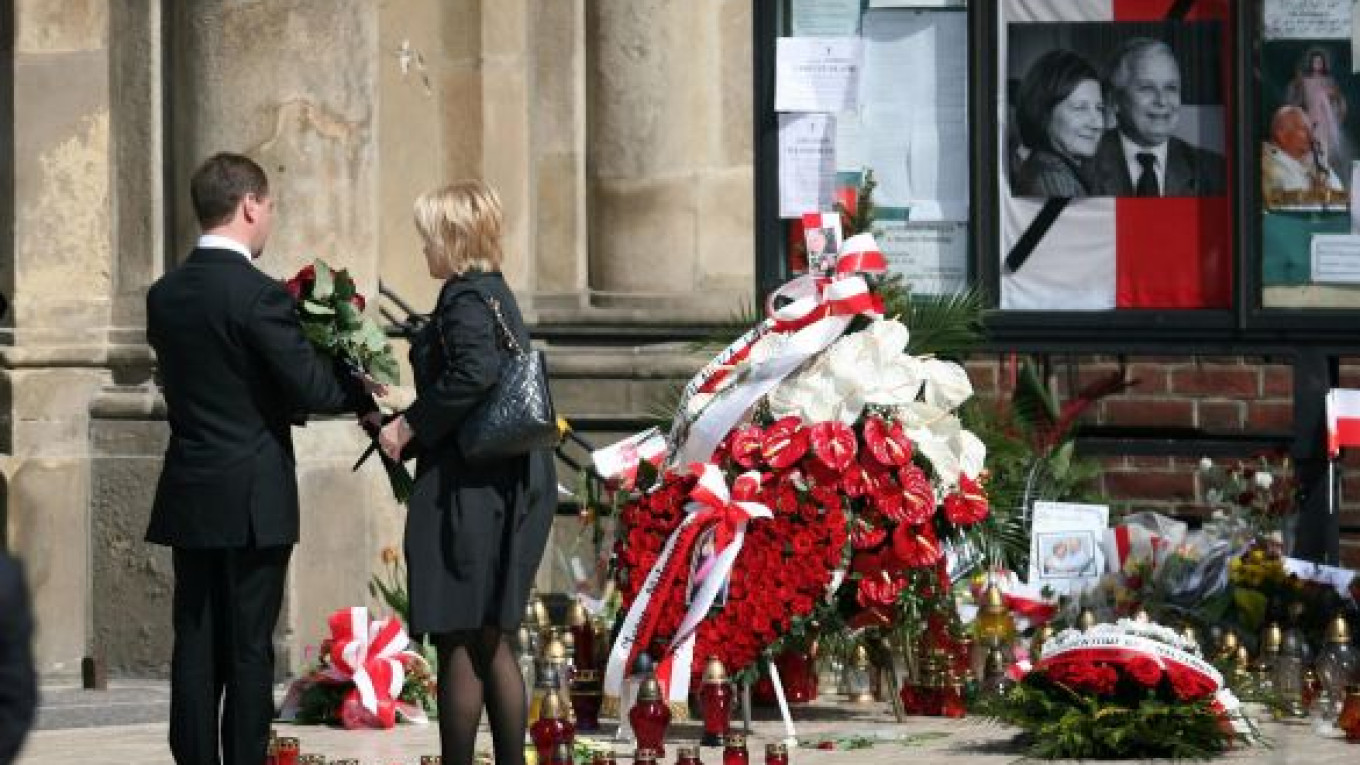KRAKOW, Poland — The leaders of Poland and Russia attending the state funeral of Polish President Lech Kaczynski said Sunday that his death in a plane crash in Russia must serve as a catalyst for reconciliation between the two nations.
President Dmitry Medvedev braved the closure of Europe's air space caused by a volcanic ash cloud to attend the funeral in Krakow — a gesture of solidarity that reinforced Polish hopes for improved ties with Moscow.
After a solemn mass, the coffins of Kaczynski and his wife, Maria, draped in the red-and-white national flag, were borne by a gun carriage through winding streets to their final resting place in Wawel cathedral, high above Poland's ancient capital.
Tens of thousands of Poles chanted "Lech Kaczynski, we thank you" and waved flags and banners of the 1980s anti-communist Solidarity movement, which the combative nationalist and devout Roman Catholic once helped to build.
Kaczynski, his wife and 94 others, mostly senior Polish political and military officials, died when their plane crashed in thick fog near Smolensk on April 10.
They had been heading to the Katyn forest to mark the 70th anniversary of the massacre of 22,000 Polish officers and intellectuals by Soviet secret police. For decades until 1990, Moscow denied responsibility for their deaths, blaming the Nazis.
"President Lech Kaczynski's testament must be fulfilled through rapprochement and reconciliation [with Russia]," acting President Bronislaw Komorowski told mourners in Krakow's medieval St. Mary's Basilica.
"Because of the Smolensk tragedy, the whole world has learned about Katyn," Komorowski said.
Speaking to Polish television shortly before boarding his plane back to Moscow, Medvedev said: "In views of these heavy losses, I believe we can make serious efforts to draw our nations closer together, to develop economic relations and find solutions to the most difficult problems, including Katyn."
Cardinal Stanislaw Dziwisz, conducting the funeral mass beneath Europe's largest carved Gothic altar, thanked "our Russian brothers" for their help and support since the crash.
"[This] gives us hope for reconciliation between our two great nations," said Dziwisz, former personal secretary of the late Polish pope, John Paul II.
Poland and Russia are at loggerheads over various issues, including missile defense, NATO enlargement and gas pipelines.
Medvedev assured Komorowski in their private talks in Krakow that Russia would cooperate fully with Poland regarding the crash, the Polish state news agency PAP said. Russian investigators have said they believe pilot error caused the disaster.
The Kremlin leader's presence was ironic in view of Kaczynski's frequent criticism of what he called Russia's "imperialism" toward former Soviet republics such as Georgia. In his five years as president, Kaczynski never visited Moscow.
Kaczynski's daughter, Marta, and his twin brother, Jaroslaw, who heads Poland's main opposition party, had insisted that the funeral go ahead Sunday as planned, despite the ash cloud that has closed Polish and other European airports.
Other mourners included the presidents of Germany, Ukraine, the Czech Republic, Hungary, Slovakia, Romania and Georgia.
U.S. President Barack Obama, German Chancellor Angela Merkel and French President Nicolas Sarkozy were among those forced by the ash cloud to abandon plans to attend Kaczynski's funeral.
"President Kaczynski was a patriot and close friend and ally of the United States, as were those who died alongside him, and the American people will never forget the lives they led," Obama said in a statement.
Poland, part of the Soviet bloc during the Cold War, is now a member of NATO and a close U.S. ally.
The funeral crowned a week of unprecedented national mourning for the Kaczynskis and the other crash victims.
In Warsaw, more than 180,000 people lined up day and night to view the coffins at the presidential palace — on public display since Tuesday — and then at the city's cathedral.
In the crypt of Wawel cathedral, the Kaczynskis will lie beside Polish kings, poets and national heroes such as Marshal Jozef Pilsudski, architect of modern Poland's independence.
Some Poles have staged protest rallies and joined petitions on social media site Facebook against the decision to bury Kaczynski in such a hallowed spot.
Kaczynski was a polarizing figure whose support levels had fallen to about 20 percent before his death. He had been expected to lose a presidential election due in the autumn and now expected to take place on June 20.
The protests were the first cracks in an otherwise remarkable display of national unity since the crash.
A Message from The Moscow Times:
Dear readers,
We are facing unprecedented challenges. Russia's Prosecutor General's Office has designated The Moscow Times as an "undesirable" organization, criminalizing our work and putting our staff at risk of prosecution. This follows our earlier unjust labeling as a "foreign agent."
These actions are direct attempts to silence independent journalism in Russia. The authorities claim our work "discredits the decisions of the Russian leadership." We see things differently: we strive to provide accurate, unbiased reporting on Russia.
We, the journalists of The Moscow Times, refuse to be silenced. But to continue our work, we need your help.
Your support, no matter how small, makes a world of difference. If you can, please support us monthly starting from just $2. It's quick to set up, and every contribution makes a significant impact.
By supporting The Moscow Times, you're defending open, independent journalism in the face of repression. Thank you for standing with us.
Remind me later.


